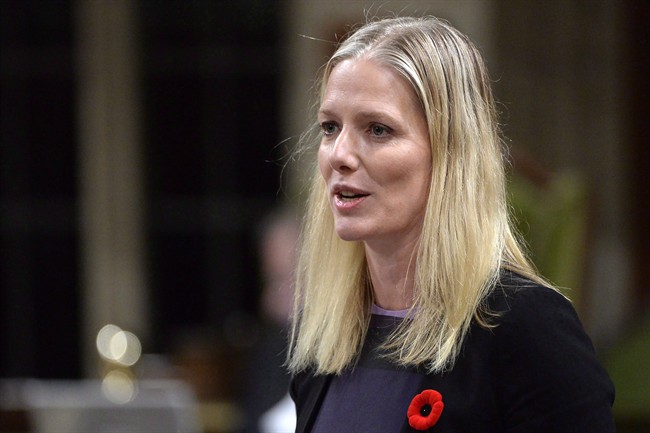The federal government says it will work with the provinces to develop a national clean fuel standard, the latest piece in its pan-Canadian climate plan.

Environment Minister Catherine McKenna announced the measure in a speech Friday to the Toronto Board of Trade as she continues preparing the ground for a first minister’s meeting next month in Ottawa.
READ MORE: Canadian business leaders urge federal government, provinces to act on climate change
Prime Minister Justin Trudeau is tentatively scheduled to sit down with the provincial and territorial premiers in two weeks, with a goal of putting Canada on a co-ordinated policy track toward reaching its international 2030 emissions reduction targets.
WATCH: Coal-fired electricity to be phased out in Canada by 2030

The Liberal government has been rolling out climate policy elements all fall as it attempts to reassure environmentally conscious Canadians while simultaneously pushing ahead with energy infrastructure approvals.
McKenna’s proposed clean fuel standard remains to be negotiated with the provinces, some of which already have variants that dictate percentages of cleaner-burning biofuels in gasoline and diesel.

Get breaking National news
But a backgrounder released Friday by Environment Canada said the new standard will apply to “many sectors” beyond transportation, including home and building heating and industrial power. The standard will also be “based on life cyle analysis” of the fuel, meaning production emissions will also be counted, placing pressure on the next generation of biofuels to reduce their overall carbon footprint.
READ MORE: Many Canadians unaware of ‘magnitude of challenge’ in reaching 2050 climate goals
“Designed well, it will stimulate Canadian production of renewable biofuels from the agriculture sector and use lower-carbon fossil fuels such as natural gas,” McKenna told her audience.
A discussion paper on the subject won’t be published until February, according to the backgrounder, “to guide consultations consisting of meetings, workshops and technical working groups.”
The background paper suggested the clean fuel standard could reduce Canada’s emission by 30 million tonnes annually by 2030, although the devil will be in the implementation details.
WATCH: Environment Minister Catherine McKenna calls climate deal ‘historic’

British Columbia’s existing clean fuel standard, for instance, has reduced annual GHG emissions to date by about 0.9 million tonnes a year, according to the province. But B.C. projects those reductions will reach 3.4 million tonnes annually by 2030.
Clare Demerse of Clean Energy Canada, a think tank based at Vancouver’s Simon Fraser University, said the B.C. policy has been “a very quiet success story, reducing pollution while attracting virtually no opposition – which is perhaps a reflection of just how little it hits British Columbians at the pump.”
Last month, a report by Clean Energy Canada suggested that B.C.’s provincial program, expanded nationally, would trim 30 million tonnes of emissions annually by 2030.
READ MORE: Canada not ready for catastrophic effects of climate change, report warns
In an interview, Demerse said the federal plan appears to be more broadly based than B.C.’s, but details remain to be worked out with the provinces.
“While today’s announcement drew the outline, the details still need to be coloured in,” she said.
READ MORE: Donald Trump backs away from vow to pull out of the Paris climate agreement
Last year in Paris, Canada committed to cutting emissions 30 per cent below 2005 levels by 2030, even though national emissions have been gradually tracking upward for the past five years after a recession-induced dip in 2009.
The most recent national inventory from 2014 indicates Canada needs to cut more than 200 million tonnes of GHGs annually by 2030 to achieve its Paris promise of 524 million tonnes – which McKenna has characterized as a “floor.”







Comments